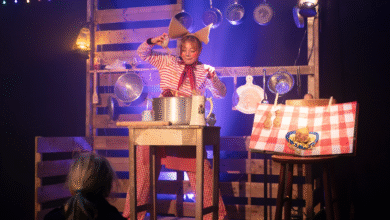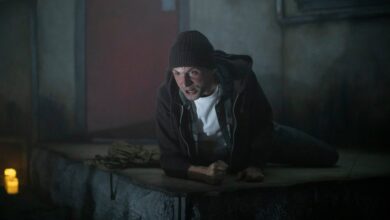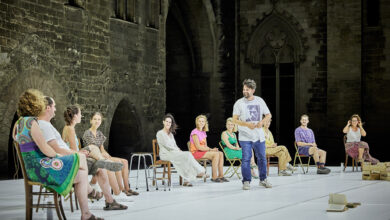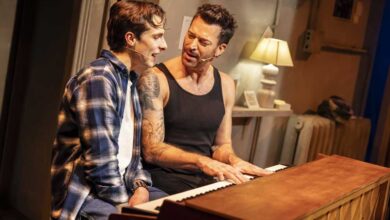Review: Hibernation, Battersea Arts Centre
Hibernation is a marvellous musical where families can learn a little, laugh a lot, and generally join in, as funny forest friends wake us up to the ins and outs of their winter sleep. summary
Rating
Excellent
Yaaaaawn! It’s cold outside, so quite the struggle to drag myself from my snug, comfy sofa and make my way to Battersea Arts Centre. But Little Bulb’s Hibernation turns out to be a fun family forty-five minutes and well worth the trip.
It’s such an ideal family atmosphere at BAC, with its relaxed policy and Pay What You Can scheme meaning everyone gets access to live performance. Today, the auditorium in the Council Chamber is filled with warm light and birdsong, as youngsters stream in with their adults. It’s soothing and autumnally atmospheric. We are warmly welcomed by BeeAtrice the Worker Bee (a delightfully engaging Clare Beresford) who makes everyone feel special – even the cuddly companions who have been invited along with their children. Hopefully, like me, they are all ready for a nap, because today’s story introduces some woodland creatures who are about to settle down for a winter sleep.
But napping is definitely not on the agenda to begin! We’re anticipating the arrival of the Queen Bee so must all learn some bee language and have our wings ready to flap later. The audience is quickly engaged in the fun of the forest and ready for the off, but in a pleasantly unpressured way, so if they don’t want to participate yet, that’s fine too.
We then meet some hilarious woodland creatures who explain to us how they hibernate, all played vibrantly by Beresford and Dominic Conway, in a series of silly sketches. These are talented physical performers, filling the space with energy and really full characterisation, which delights the young spectators. Through live music and song, audience interaction and fabulously fun characters, they have everyone laughing, while still managing to be highly educational. Who knew bees have leg claws?
Each story is quite different in tone, giving contrast and texture to the performance and carrying the audience nicely through the separate sections. The songs are cheerfully entertaining and varied, played live on numerous instruments including a mandolin, a double bass and a kazoo! Additionally, the cast showcase multiple musical styles and excellent vocal harmonising. My particular favourite was the 12-bar bat song, which beautifully transported us to a completely different atmosphere and back again, with the help of just a little focused lighting. Strategic leaf collecting by onstage technician Alexander Scott provides amusing interludes to cover costume changes and keeps things rolling seamlessly on. It’s technically smooth.
A quick word in favour of coats as costumes. OK, so it’s an easy solution to just put a different coat on for each character – but that snake in a green raincoat is so totally brilliantly silly, it’s almost Monty Python! (see what I did there??). And importantly, you can then imagine the smaller audience members going home and acting out the creatures themselves with their own outerwear. Great fun to be had long after the show has finished!
Pleasingly, the audience are very much part of the performance, occasionally mentioned by name because BeeAtrice has put them on the guest list, asked for their opinions and to share their knowledge. There’s always an alternative way to join in so no-one’s left out; if you can’t click your fingers then smack them on your palm to make the noise. Even the cuddly friends get a moment to shine.
We’ve all had a chance for a cosy doze with a blankie or a cuddly, thanks to the bears’ lovely lullaby. As the show ends, the families skip happily out of the theatre and we find ourselves awake in the sunshine, still singing the songs! Hibernation is definitely the perfect show for springtime.
Written and devised by Little Bulb Theatre Company
Supported by Farnham Maltings, Trowbridge Town Hall and Arts Council England
Hibernation is a family show aimed at ages 3-7. It plays at Battersea Arts Centre until Saturday 18 February. Booking details can be found here.








3 Comments